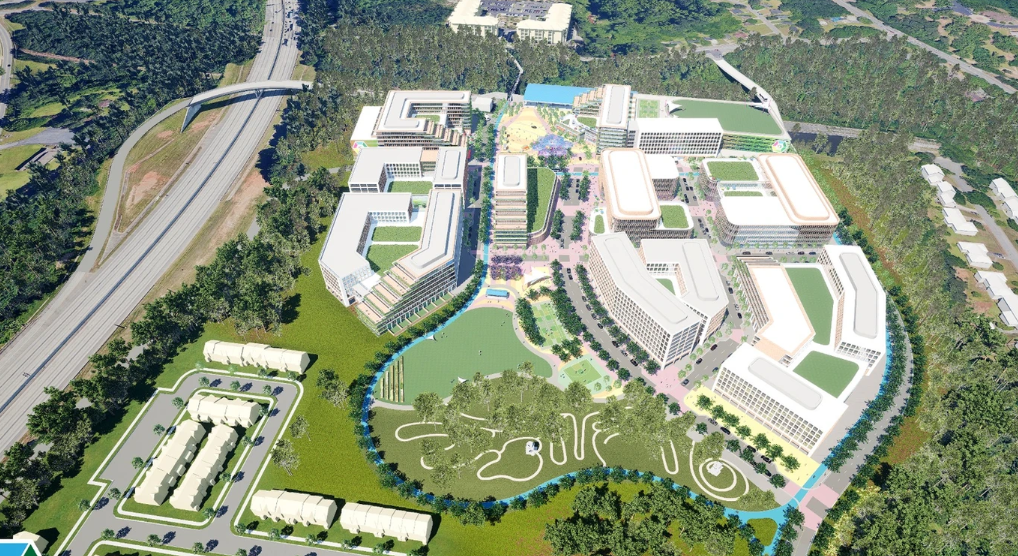Residents in Stone Mountain’s Pepperwood neighborhood say DeKalb County’s sanitation trucks have been mixing trash and recycling together.
DeKalb County commissioners kept hearing complaints from perplexed homeowners: Garbage crews were routinely mixing their blue bins — recycling — with their green bins, trash.
Commissioners Ted Terry and Lorraine Cochran-Johnson say the calls started in 2021 and kept coming.
“We asked the administration for two years and they were like, ‘Nothing to see here,’ “ says Terry, who feels like commissioners and the public were “gaslighted.”
The size of the drop was convincing. In 2020, with people staying home because of COVID, recycling in DeKalb increased. But in 2021, it plummeted by almost half, from 14,500 tons to 7,800 tons. In 2022, it dropped again to just over 6,000 tons.
“The red light for me was that the math wasn’t mathing,” said Cochran-Johnson, who is now running for county CEO.
When commissioners asked, they say they were told varying stories by the administration. Perhaps the recycling was mistakenly dropped off by county trucks at garbage transfer stations.
That raised eyebrows. A few transfer station screwups doesn’t account to half of your recycling tonnage disappearing.
But, again, this is DeKalb and weird stuff has been known to happen.
In September, Sara Gregory, the AJC’s DeKalb beat reporter, followed a garbage truck for a couple of blocks and saw for her own eyes what others had been saying: The blue and green bins were being dumped into the same truck at house after house.
She approached the workers to ask about it and they got nervous and stopped collecting anything — green or blue. They told her they were going to call the cops.
A week later, the sanitation department put out directives to their crews about how the process was supposed to properly work.
And the recycling tonnage almost immediately increased. Drastically.
The following month, Sanitation Director Tracy Hutchinson stood before commissioners and told them her office was trying to get to the bottom of the mystery.
She told commissioners trucks were being tracked, weights were being collected daily and drivers had to verify that they were going to the right drop-off station. She said she also met with Pratt Industries, the county’s recycling processor, to make sure they were weighing the loads correctly.
One might assume supervisors even explained to crews the difference between blue bins, recycling, and green, which is smelly old garbage.
Lavois Campbell, who heads the county’s independent auditing office, announced he was stepping in to try and figure out what was going on. His investigation would take at least a couple months, he said in October. It still hasn’t been released.
It all seemed like a real riddle wrapped in a conundrum.
Well, not really.
The county, like other entities, had suffered from worker shortages, especially in the sanitation department. And pickup would go more smoothly if crews just rolled by and picked up blue and green bins at the same time.
If you ponder it for 10 seconds, there was really only one explanation: Higher-ups in DeKalb made the decision to mix the recycling and garbage together. I mean, you don’t get a systematic, and sustained, drop in recycling tonnage by a few rogue crews deciding to make their lives easier by tossing the contents of both green and blue bins into their trucks.
I posed the questions to county officials and, just for the heck of it, shot a text to CEO Michael Thurmond.
He called back.
“You’re right,” he said about my theory.
“But,” he added, “There’s a broader context. What was going on in the world? There was a pandemic that lasted two-and-a-half years,” he said, answering his own question.
Thurmond said sanitation crews, often sitting three across in a truck, were getting COVID or were exposed to it at a far greater rate than other employees. Some months, the department was down 40%, he said.
“In a pandemic, what’s the most important thing?” he asked. “Sanitation,” he said, again answering his own question.
“A policy decision was made. First thing you do is get (garbage) off the curb. Recycling dropped in priority.”
“When you’re in the middle of a crisis, you have to do what you have to do; it was a battlefield decision,” he said, adding, “People were seeing what they were seeing because that’s what happened.”
Dekalb CEO Michael Thurmond speaks at a press conference in Decatur announcing a $284 million water infrastructure finance and innovation act loan to Dekalb County on Thursday, May 19, 2022. (Arvin Temkar / arvin.temkar@ajc.com)
Why not just say that? I asked.
“Well, no one asked,” he said. Or, he added, no one had asked him.
But people certainly were asking. Publicly. In meetings. In the news. In calls to the county. In an audit.
Thurmond has been in politics for going on 40 years and knows the best way to kill a budding story, especially a whodunnit, is to tell the truth.
I called commissioners Terry and Cochran-Johnson to let them know what I heard.
“I’m shocked,” said Cochran-Johnson. “For a year I was told didn’t see what I saw.”
“What?!?” Terry said, laughing in a stunned kind of way. “They made that decision for two years? And then hid it? It doesn’t make sense.”
He’s right. All I can say is, “It’s DeKalb.”
And someone ought to tell that auditor fellow he can now stop investigating.












